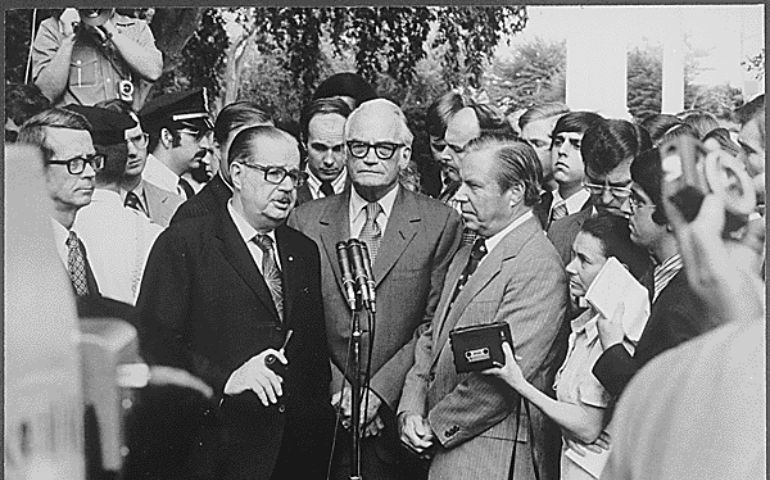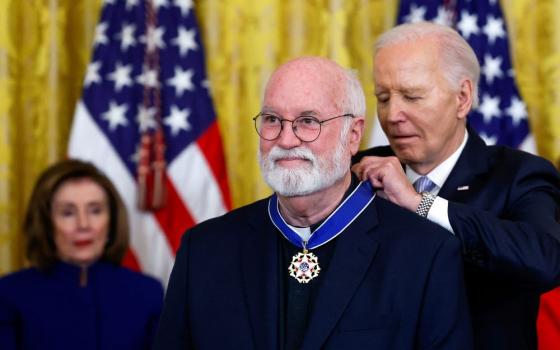
Rep. Hugh Scott, Sen. Barry Goldwater and Rep. John J. Rhodes speak to reporters after a meeting with President Richard Nixon about the Watergate situation, August 7, 1974. (National Archives/Oliver F. Atkins)
Comparisons between Presidents Donald Trump and Richard Nixon have begun to percolate more loudly than a noisy coffee machine on a cold, quiet morning. Monday's hearing at which FBI Director James Comey confirmed his agency was conducting an investigation into potential cooperation between the Trump campaign and Russian authorities will surely make the comparisons more likely. But are they accurate?
Last week in The Washington Post, Dan Zak interviewed John Dean, the White House counsel to Nixon who famously broke with the president over the ever-increasing cover-up. Dean is working on a book about Trump, and he recalled that his last book, Worse than Watergate, profiled President George W. Bush and Vice President Dick Cheney. "I should've saved that title actually," he commented dryly.
Acknowledging that, so far, the Russia troubles Trump brought on himself bear no real comparison to Watergate, and that we do not know what the equivalent of the burglary is in the Russian mess, Dean nonetheless saw some similarities rooted in the two men's personalities. "His paranoia about leaks — we're seeing that," Dean told Zak. "His authoritarian manner in dealing with situations that most people would let go. … That amazing Feb. 17 news conference is way beyond what Nixon would tangle with, even if he was inclined. Nixon had great respect for the office."
Politico ran an article by James Robenalt that explored Nixon's early thoughts on how to shut down the Watergate investigation, his looking for a way to keep the Democrats at bay by dragging Lyndon Johnson into it, and the growing sense of paranoia and vindictiveness that eventually brought Nixon's presidency to an end. After noting the obvious differences (e.g., their different economic situations, dramatized by the contrast between Pat Nixon's "respectable Republican cloth coat" and Melania Trump's stylish wardrobe), Robenalt contends that what unites the two men is a fear of losing:
This dominant emotion — fear and loathing of losing — has been studied by social scientists like Princeton psychologist Daniel Kahneman. He found in a study that won the Nobel Prize in 2002 that people facing losses act irrationally because all humans hate to lose much more than they like to win — by a factor of almost three times. It is a deep, ingrained aversion. Imagine what the factor is for people like Nixon and Trump.
I look forward to seeing Trump tell the cameras, "I am not a crook," and I find the probing of the psychology of the two men fascinating. Certainly, one of the more interesting questions about every president in my lifetime, starting with Kennedy, is how they related to their fathers!
But I am not a shrink, so let's look at the Watergate analogy through a different lens. There are two major differences between Watergate and the Russian mess, both of which suggest that Trump's problems may even be greater than Nixon's
First, Nixon's effort to subvert the election of 1972 and then exercise unconstitutional means to cover it up was an entirely domestic affair. His cronies were all Americans. The break-in at the Democratic National Committee offices in the Watergate complex was conducted by U.S. operatives, not Russian hackers. Nixon's effort in 1968 to frustrate a peace deal in Vietnam before the election, that may have been more analogous to the situation we see today, in which the interest of the United States, to say nothing of the fate of millions of people in Vietnam, were compromised in order to obtain a better election outcome. But that had nothing to do with Watergate.

President Richard Nixon, right, talks with Leonid I. Brezhnev, leader of the Soviet Union through an interpreter, June 19,1973. (National Archives/Robert L. Knudsen)
No, we all knew about the break-in at Watergate the day after it happened. It was not even big news. What brought Nixon down was the cover-up, and that cover-up was exposed through the tenacious journalism of Carl Bernstein and Bob Woodward, and the support they received from their editor, Ben Bradlee. They did not focus on the burglary but on the cover-up, which had no stain of foreign entanglement, and that was what brought Nixon down.
The second difference is the more disturbing, and it is related to the first. It is unlikely that anyone in Trump's orbit reached out directly to an operative with Russia's federal security service, the successor to the KGB. The relationships that have already been demonstrated between Trump's team and Russian officialdom seem to pass through business channels. Nixon had his cronies in the business world too: Remember Bebe Rebozo? But much has changed in the world of business since the early 1970s, and one of those things is the idea, the pernicious idea, that a CEOs fiduciary responsibility to shareholders allows the CEO to set aside any and all moral concerns.
Want to deny workers their right to organize? Go for it: You have a fiduciary responsibility to your shareholders. Robbing an underdeveloped nation of its natural resources by paying off corrupt government officials? All in the name of profits for those shareholders, to whom you have a fiduciary responsibility. Going to move a company from Michigan to Malaysia, even though it will decimate a community in Michigan and rely on slave wages in Malaysia? It will add to the bottom line, and your job as CEO is to increase shareholder value pegged to that bottom line.
In dealings with Russian oligarchs, there is the more ancient but very strong temptation posed by vast sums of money. Damn the "eye of the needle" metaphor when you can sell a house for $95 million to a Russian billionaire, even though you only paid $40 million for it a few years back. Why ask pesky questions about why someone would pay such an inflated price? Why disturb your sleep, or your conscience, with concerns that these kinds of deals usually reflect a desire to hide or launder money? Why undertake much in the way of due diligence when building Trump Tower in Baku, Azerbaijan, with a business partner who likely launders money for the Iranian Revolutionary Guard Corps?
I do not think the people around Trump's campaign turned to the Russians because they knew they needed help beating Hillary Clinton. It is far more likely that a series of corrupt attitudes and extant business relationships made whatever involvement took place seem entirely sensible. An exercise of fiduciary responsibility to the Trump base. Why would anyone entertain pesky constitutional questions in the conduct of a political campaign anymore than you would entertain pesky moral ones in conducting a business transaction?
In short, the corruption of the people around Trump may be more thorough-going than the corruption of John Ehrlichman, H. R. Haldeman, Charles Colson, John Mitchell and the rest of Nixon's felons. And if that doesn't frighten you, consider this: It is these very business people who are the only thing standing athwart Steve Bannon's apparent efforts to lead America down the path of authoritarianism! Amoral businessmen or Mussolini-style governance. Is this a choice that will make America great again?
We are living through grim, and grimly unprecedented, times. The Trump administration is a wreck. Overseeing it all is the man who, Michael Gerson wrote yesterday, "often conducts his affairs with peevish ignorance." This Russian mess may prove to be "worse than Watergate." As in that case, the nation will have to extricate itself from this mess and I am strangely hopeful that the current investigations into Trump's ties to Russia end with the same result for this president as Watergate ended for Nixon, impeachment.
[Michael Sean Winters is NCR Washington columnist and a visiting fellow at The Catholic University of America's Institute for Policy Research and Catholic Studies.]








